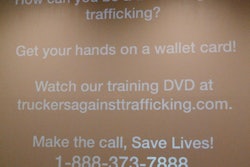Since 2004, missing persons advocate Marc Klaas of the Klaas Kids Foundation has been part of an effort by a company associated with Flying J travel plazas to get an FCC exemption to establish a low-power broadcasting operation at truck stops. The emphasis of the operation would be not only on entertainment but, most importantly for Klaas, information about missing persons and others likely to be spotted on the nation’s highways. Klass’ blog for the “Klaas Act” updated on the 4th last week with the latest in a series of truck drivers’ Amber Alert responses that have resulted in lives saved.
The post told the story of North Carolina driver Beano Francis, who spotted a white Ford Escort he recognized from an Amber Alert that was carrying an abducted 13-year-old. You can read the full post here, but suffice to say it holds lessons in the efficacy of truckers’ well-trained eyes and ears when it comes to thwarting abductors when armed with potent information. The rescue, Klaas notes, made for dramatic news, “but professional truckers responding to Amber Alerts is actually fairly common — it was even the second success story in North Carolina in July alone.”
Klaas went on to note his long-held idea to make such information more readily available to drivers at truck stops via hyper-local television broadcasts — such a service, combined with other efforts like the Amber Alert system and Truckers Against Trafficking’s central hotline for reporting, could well put a further dent in a huge criminal enterprise I wrote about just last week in this hall.

Klaas first came into contact with the generosity of truck drivers in assisting search efforts when his own daughter was abducted in the 1990s. “When Polly was kidnapped in 1993,” he writes on his blog, “the drivers helped circulate flyers far and wide. You rapidly realize that truckers are out there on the roads … where persons on the run frequently try to escape.”
He went on to express no small measure of disappointment in the FCC’s lack of action on the effort by “a broad-based alliance that includes the foundation we formed in the wake of Polly’s murder, KlaasKids,… to convince the [FCC] to approve a proposal that would literally bring hundreds of thousands of new truck drivers into the missing persons loop.”
Klaas describes the system as a broadcast, essentially, a driver could turn on in his bunk to access over local airwaves — as in a hotel, when the TV accesses the system it would tune to a “marker channel” at first. “The marker channel for Trucker TV will be a public safety channel,” he says. “It will deal with runaway children and other such safety issues.”
Application for relevant exemptions have been before the Federal Communications Commission since way back in 2004, says Klaas, and since 2008 he says the application’s gotten more or less ignored by the current commission chairman. For more information or to add your voice to the regulatory effort, visit this page at the KlaasKids site, and keep those eyes peeled out there for people in need.










